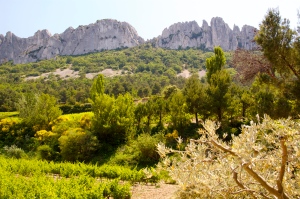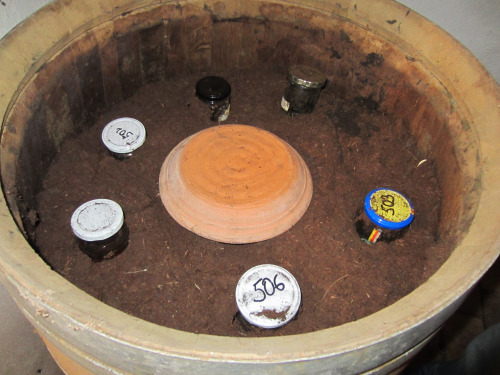The last several months have been bursting with emotion. Frustration, anxiety, self-reflection, relief, elation. It is true what they say, that human beings have a difficult time with change, but also that it is essential, clearing the old dusty parts of us to make way for the succulent new growth (perhaps it is no coincidence that this process has occurred in sync with the emergence and growth of the vine itself).
 The magnificent Dentelles de Montmirail in the southern Rhône valley
The magnificent Dentelles de Montmirail in the southern Rhône valley
I left my full-time winery job back around the holidays, needing to redistribute my time and energy in order to find a job more along the lines of what I really wanted to do long-term. But I quickly realized that I had absolutely no idea what that was. I applied for jobs a bit half-heartedly, but between my own disenchantment and the lamentable state of the French job market, the search bore little fruit. I also began applying for PhD positions in anything remotely related to environmental chemistry, but when it came down to it, the opportunities that I was offered just didn’t feel right and I couldn’t bring myself to commit to such an intense journey without being 100% on board.
Around the time I was starting to feel the effects of this visceral anxiety of being unable to discern the desires of my own soul – a form of identity crisis in our society with its hyperfocalization on what one does in life, I stumbled upon the University of Cambridge’s History and Philosophy of Science department. I had already thought about trying to pursue some kind of science studies or history of science route in France, but I couldn’t find the information I wanted and found my research thwarted by a collection of unanswered emails, so I’d let the idea slip aside. It had never occurred to me to look in the UK as I hadn’t been ready to expand my search beyond France, but now that the months remaining on my visa were ticking conspicuously away, England suddenly felt much closer.
Applications were still open for the 1-year MPhil program, which was recommended to me by a couple of professors in the department, to get a taste for the department and give me the time to prepare a PhD proposal. I applied and was accepted only a few weeks later. I had simultaneously received another opportunity that, on paper, seemed perfect for me (a PhD in geochemistry looking at the interaction between soil and microbes in vineyards), but there was really only one of these choices that felt right in my heart. Questions raised by the history of science and science studies have truly guided all that I’ve done in the past three years, and have informed all of the big questions that have captivated me throughout all of my wine related adventures. Going to Cambridge for this MPhil, and writing a PhD proposal to study the history of biodynamic agriculture, a topic that has fascinated me endlessly, is a path forward that allows me to maintain my links to science, to agriculture, to nature and to the wine industry.
After college, I seized the opportunity to leave the academic world because I felt the need to know what other paths existed. I wanted to experience the big questions instead of just thinking about them. And for nearly four years I have lived incredible experiences, learned amazing lessons, and I am eternally grateful for each one of them. But one of these lessons that I’ve learned is that I like the theorizing, the musing, the questioning, and I’m ready to hit the books.

